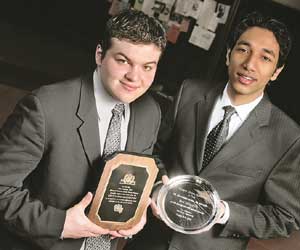‘ . . . X squared, Y squared, H2SO4, Who for? What for?’ . . . The Maroons and a Model U.N. ‘Triple Crown’
By Josh SchonwaldNews Office
 Will Segal (left) and Yasser Ghanchi both won best delegate awards for their committees in the Model United Nations competition that took place at Harvard University last month. Segal, the team president, and Ghanchi, last year’s president, led Chicago to a “Triple Crown” victory this year, after also winning two other prized conference competitions at the University of Pennsylvania and Yale University earlier in the academic year. | |
It was a tight competition with the very best young diplomats from Yale University and the U.S. Military Academy at West Point, but in the end, the University’s Model United Nations team completed the “Triple Crown” of college diplomacy.
Last month, the 29-member team captured first place at Harvard University’s prestigious National Model United Nations conference, which included more than 2,000 student delegates from around the world.
Earlier this academic year, the Chicago diplomats won first place in both the University of Pennsylvania and Yale University Model United Nations conferences—regarded as the two other prized competitions in the world of simulated diplomacy.
The Chicago squad not only received the “Best Delegation” award, but also garnered awards for 13 of the 18 committees on which the team’s delegates served.
Team president Will Segal, who represented the Israeli Army and reenacted Israel’s strategy in the 1973 Yom Kippur War, and Yasser Ghanchi, who represented Egypt’s minister of war during battles with Israel, both won best delegate awards for their respective committees. Awards are based on several criteria, including the delegate’s ability to present strong ideas and circumvent the strategies of competing delegations.
Chicago has a longstanding reputation as a Model United Nations powerhouse, Segal said. During the 1990s, the team also completed what a Maroon reporter first dubbed “the Model U.N. Triple Crown.”
“Actually,” said Segal, who started in simulated diplomacy while in high school, “one of my main reasons for wanting to come to Chicago was because it had one of the top Model U.N. teams in the country.”
But about five years ago, the team slipped slightly from its usual perch on top of the Model U.N. world, which made this year’s success even sweeter. “We had an amazing year,” said Segal, who noted that other teams were impressed with Chicago’s improvement. Segal credits Ghanchi, a fourth-year in the College and last year’s team president, with gaining new recruits for the team.
The team also spent more time preparing for conferences than in previous years. A month of practice consists of four to five hour-long simulations, which involve speech practice, debating resolutions and presenting research. And no University endeavor would be complete without research. For Segal’s simulation, the research involved reading an autobiography of his character, Israeli army chief of staff Dado Elazar, a book about Yom Kippur War naval battles, as well as historical books about the Yom Kippur War.
After the award ceremony in Boston, the Chicago team, thrilled with its performance, concluded with its traditional cheer: “Themistocles, Thucydides, the Peloponnesian War, X squared, Y squared, H2SO4,” they shouted. “Who for? What for? Who we gonna yell for? GO MAROONS!”
![[Chronicle]](/images/sidebar_header_oct06.gif)